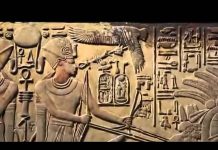In the realm of documentary filmmaking, there are those rare gems that transport us across time and space, unraveling the enigmatic tapestry of our human history. “The Pyramid Code,” a five-episode documentary series, stands as a compelling testament to this cinematic artistry. Without professing to be a film critic, this exploration aims to unearth the narrative intricacies, enlightening revelations, and tantalizing questions interwoven throughout this remarkable documentary.
At its heart, “The Pyramid Code” is a profound expedition into the ancient wonders of Egypt—the pyramid fields, the hallowed temples, and the cryptic megalithic sites scattered across the globe. However, it transcends the mere cataloging of archaeological artifacts and historical trivia. Instead, it delves deep into the elusive realm of matriarchal consciousness, ancient wisdom, and the advanced technologies of a fabled Golden Age.
The documentary series is an awe-inspiring manifestation of meticulous research undertaken by Dr. Carmen Boulter, who conducted an astonishing 25 expeditions to Egypt and ventured to 51 other countries worldwide. This extensive groundwork serves as the bedrock upon which “The Pyramid Code” stands, allowing it to offer viewers a profoundly rich and comprehensive narrative.
One of the documentary’s prominent strengths lies in its ability to seamlessly interweave the insights of esteemed scholars and authors hailing from a myriad of multidisciplinary fields. From geology and physics to astrophysics and archaeology, from biological engineering to magnetic field theory, from hieroglyphics to Egyptology—the film draws upon a dazzling array of expertise. This multidimensional approach infuses the series with a tapestry of perspectives that enriches the viewer’s understanding of the mysteries at hand.
“The Pyramid Code” embarks on a relentless pursuit of profound questions that have long eluded easy answers. It doesn’t simply present facts but encourages the audience to ponder the implications of the knowledge being unearthed. It prods us to explore the tantalizing possibility that our ancestors possessed wisdom and technologies far more advanced than conventional history would have us believe.
The series is visually captivating, with breathtaking shots of the ancient landscapes and architectural marvels. It skillfully utilizes computer-generated graphics to reconstruct the past, enabling viewers to immerse themselves in the grandeur of bygone civilizations. This visual finesse serves not only to educate but also to enthrall, making the documentary an engaging experience.
As the narrative unfolds, “The Pyramid Code” juxtaposes the monumental achievements of ancient civilizations with the modern world’s growing thirst for rediscovery. It underscores the urgent need to unearth the knowledge and wisdom of our forebears, especially in an era where technological advancements are accompanied by ethical and existential challenges.
The series also does an admirable job of steering clear of dogma and bias, presenting its findings with an open-mindedness that invites viewers to form their own conclusions. It doesn’t force-feed answers but rather stimulates a hunger for exploration and discovery—a rare trait in documentary filmmaking.
In conclusion, “The Pyramid Code” transcends the boundaries of conventional documentaries, emerging as a profound journey through time, consciousness, and the mysteries of our past. Without declaring itself a film critique, this exploration seeks to shed light on the documentary’s narrative dexterity, its commitment to extensive research, and its unwavering pursuit of knowledge. It is a cinematic odyssey that beckons us to peer into the shadows of history, compelling us to question, to learn, and to ponder the enigmatic legacies of our ancient ancestors.

































